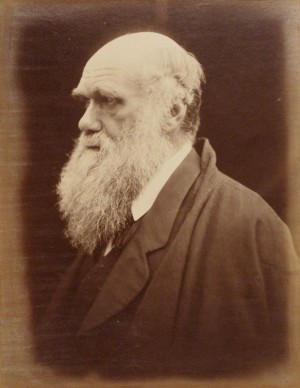
Charles Darwin
by Julia Margaret Cameron, albumen print,1868, NPG P8
© National Portrait Gallery, London
Evolution by natural selection is the foundation law of biology. So we shouldn’t be surprised that it has great relevance to cancer.
‘Nothing in biology makes sense except in the light of evolution’
Theodosius Dobzhansky, 1973
Almost 40 years ago, Peter Nowell first championed the idea that cancer is, fundamentally, a process of somatic cell evolution 1. Since then, the concept has been validated and elaborated, such that the striking parallels with Darwinian speciation by natural selection in ecosystems have been highlighted on many occasions 2,3,4.
More recently, the rapid expansion of research in cancer genomics has resulted in a massive endorsement of the Darwinian perspective. Provided with detailed genetic descriptions and the technologies for interrogating both single cells and multi-regional small biopsies, it now possible to reveal the space-time genetic diversification of cancer cells and to reconstruct clonal phylogenies. In effect, we can now chronicle evolutionary histories.
It’s a striking fact that every patient’s cancer has an individually unique and very varied clonal architecture and evolutionary history. This knowledge is now driving practical oncology in the clinic. Quantitative measures of intra-clonal genetic diversity (measures of the genetic differences between the many descendants of the tumour’s few formative cells) appear to be predictive of the progression of a disease. Clinical response can also be predicted, probably as a surrogate for the probability of drug resistance. Furthermore, measures of tissue ecosystem diversity may also be predictive of outcome; again this is as would be predicted from evolutionary principles, since the ecosystem provides the selective pressures for clonal diversification.
Observations such as these endorse the idea that evolutionary biology can provide a very appropriate and clinically valuable perspective on cancer. Potentially, this is a paradigm shift with major implications for the way we think about the fundamental biology of cancer and for our attempts to control it 5-8. Evolutionary considerations will help us to explain the big questions, such as “Why are humans so vulnerable to cancer?” 9Evolutionary biology shouldn’t be regarded as a sub-topic of cancer sciences, it is a conceptual framework for every aspect of our endeavours in cancer.
Most biologists, epidemiologists and oncologists involved in cancer research are to some extent aware of cancer’s evolutionary character. But many, on a day-to-day basis, have insufficient appreciation of the underlying biological principles and their potentially radical clinical implications. At the same time, the topic of cancer evolutionary biology is expanding very rapidly with increasing numbers of papers in premier journals and major presentations at conference symposia. So we think that the time seems right for a commentary-style blog designed to communicate these exciting new advances and to foster debate.
This British Journal of Cancer-based blog is aimed at trainees and senior professionals in all areas of cancer research and treatment – for academic biologists, clinicians, chemists (in drug development for example) and epidemiologists, as well as pharmaceutical industry-based scientists involved in cancer therapeutics. But we hope our content will also interest evolutionary biologists considering the implications of their field for human health and biologists and clinicians engaged in the related but broader topic of evolutionary medicine 10.
In the first week we will publish three introductory pieces setting the scene and giving a gentle introduction to some of the more complex themes that will feature in posts to come. Later in the month we will publish the first of the regular discussion posts which will address key issues and new insights into the evolutionary biology of cancer as and when they arise. We hope to also feature guest posts from invited scientists and clinicians.
My primary objective is to facilitate debate, particularly on contentious issues, so I invite responses from readers either using the comments section or the contact page. Most of all, I and those who have helped set up this blog at the BJC hope you will find it a stimulating read.
Mel
References
1. Nowell PC (1976) The clonal evolution of tumor cell populations. Science 194: 23-28.
3. Greaves M, Maley CC (2012) Clonal evolution in cancer. Nature 481: 306-313.
4. Yates LR, Campbell PJ (2012) Evolution of the cancer genome. Nat Rev Genet 13: 795-806.
9. Greaves M (2007) Darwinian medicine: a case for cancer. Nat Rev Cancer 7: 213-221.